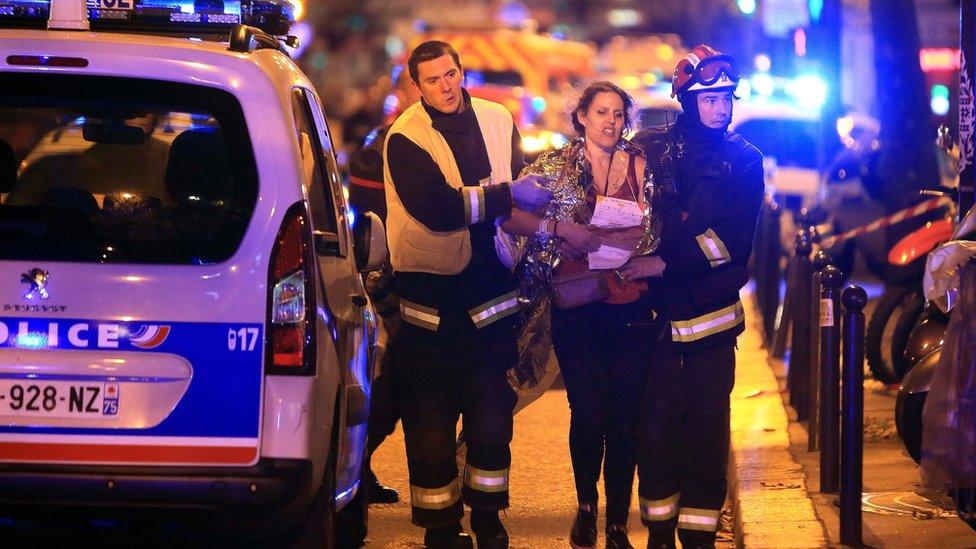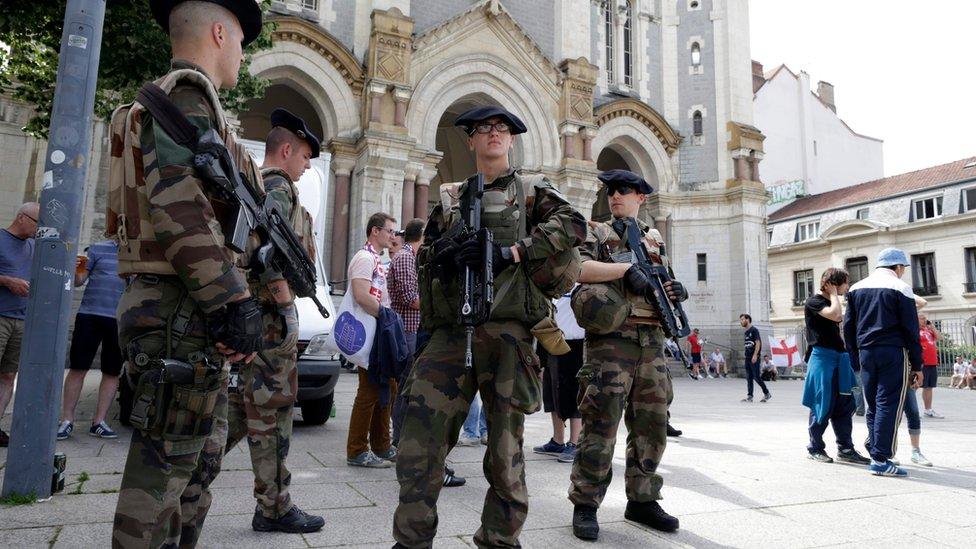Paris attacks: Call to overhaul French intelligence services
- Published

The attacks last year left a total of 147 people dead
French intelligence services should be overhauled following last year's terror attacks in Paris, a parliamentary commission of inquiry has recommended.
Commission president Georges Fenech said all the French attackers had been known to authorities, but these had not communicated with each other.
He proposed a single body like the US National Counter-Terrorism Centre.
The January and November attacks, which killed 147 people in all, prompted criticism of the security response.
From Paris to Brussels: Why the attacks are linked
Charlie Hebdo lives on but 'in darkness'
Charlie Hebdo attack: Three days of terror
"Faced with the threat of international terrorism we need to be much more ambitious... in terms of intelligence," said Mr Fenech.

All trace of suspects lost - Hugh Schofield, BBC News, Paris

The committee chairman George Fenech says the aim of the report is not to designate guilty parties, but to make the general point that France's intelligence system failed.
All three of the of the attackers at the Bataclan, for example, were known to the security services and yet all trace of them had been lost.
Part of the problem, the committee says, is a multiplicity of competing agencies and no clear vision of which does what.
For example, the national police and gendarmes have separate intelligence arms and the Paris police have a third, with the result that when one of the Charlie Hebdo attackers moved from Paris some time before the attacks, he disappeared from the radar.

The six intelligence agencies currently operating in France should be merged into a single agency directly under the prime minister's authority, the commission said.
This would improve information-sharing and make it easier for foreign agencies to know who to deal with.
Paris attacks: Key locations
It listed a series of mistakes, including the failure to track known extremist Amedy Coulibaly - who took hostages at Jewish supermarket two days after the Charlie Hebdo attack - after his release from prison.
Meanwhile Samy Amimour - one of the attackers who killed 89 people at the Bataclan concert hall - who was able to get to Syria in 2013 despite a travel ban.
The commission also said there should be much greater priority given to intelligence gathering within prisons.
And it criticised the Belgian authorities for failures over Salah Abdeslam, a key figure in the November attacks who was stopped at the border the next day but released because the Belgians had not provided information about his links to militancy.

Competing police units - Lucy Williamson, BBC News, Paris

The conclusions of Mr Fenech on the actions of security forces that night in November make dramatic reading.
When police officers arrived on 13th at the Bataclan nightclub, where more than 100 people were being held by gunmen, the officers asked a local military patrol to give them their weapons, but the military police refused.
Mr Fenech also asked why the commander of a serious crime unit was put in charge of the operation, when the country also had a special operations force available and an elite unit specialising in counter-terrorism and hostage situations.

Meanwhile the continuing state of emergency imposed after the attacks was only having a "limited impact" on security, the commission found.
Investigators also questioned the deployment of between 6,000 and 7,000 soldiers to protect schools, synagogues, department stores and other sensitive sites.

Thousands of soldiers are on duty following last year's attacks
"I am wondering what real added value they provide in terms of securing the national territory," said Socialist MP Sebastian Pietrasanta.
Last January's attack on the offices of satirical magazine Charlie Hebdo, the shooting of a policewoman and a siege at a Jewish supermarket killed 17 people.
In November, 130 people died in co-ordinated gun and bomb attacks on a concert hall, restaurants and the Stade de France, where an international football match was taking place.